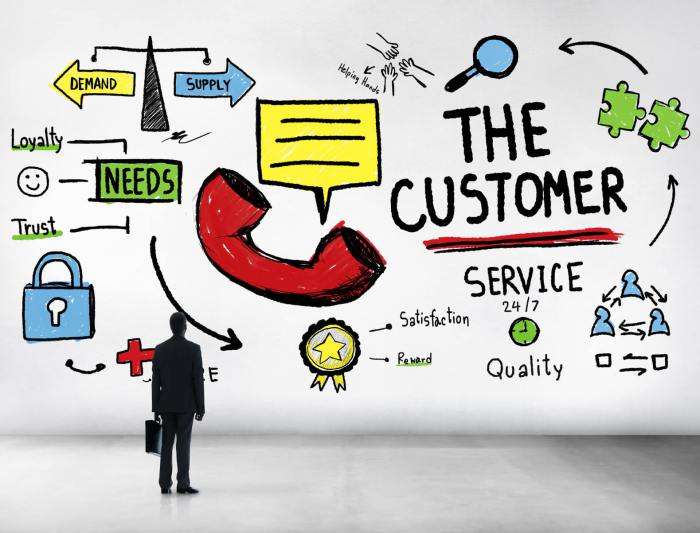Customer Service Excellence is the name of the game, where businesses strive to provide top-notch service to keep their customers happy. Get ready to dive into the world of exceptional customer care with a fresh perspective that’s bound to keep you intrigued.
In this guide, we’ll explore the definition, importance, key elements, strategies, and measurement of Customer Service Excellence to help businesses elevate their customer service game.
Definition and Importance of Customer Service Excellence

Customer service excellence in a business context refers to consistently providing exceptional service and support to customers in order to meet and exceed their expectations. It involves going above and beyond to ensure customer satisfaction and loyalty.
Customer service excellence is crucial for businesses to succeed because it directly impacts customer retention, brand reputation, and overall profitability. Satisfied customers are more likely to become repeat customers and recommend the business to others, leading to increased sales and revenue.
Examples of Companies Known for Exceptional Customer Service, Customer Service Excellence
- Amazon: Known for its fast delivery, easy returns, and responsive customer support.
- Zappos: Focused on creating a personal connection with customers through exceptional service and a generous return policy.
- Ritz-Carlton: Provides legendary service by empowering employees to go above and beyond to meet guest needs.
- Apple: Offers top-notch customer service through its AppleCare support and in-store assistance.
Key Elements of Customer Service Excellence
Effective customer service excellence hinges on several key elements that are essential in providing exceptional service to clients. One of the most crucial elements is communication, which plays a vital role in understanding customer needs and addressing their concerns promptly and effectively.
Effective Communication
Effective communication is paramount in achieving customer service excellence. It involves active listening, empathy, and clear articulation of solutions to customer issues. By understanding the customer’s perspective and responding appropriately, companies can build trust and loyalty with their clientele.
- Active Listening: Customer service representatives must listen attentively to customer inquiries, complaints, and feedback to provide relevant and personalized assistance.
- Empathy: Showing empathy towards customers demonstrates care and understanding, fostering a positive relationship and enhancing customer satisfaction.
- Clear Articulation: Communicating solutions, policies, and information clearly and succinctly helps customers grasp the necessary steps to resolve their concerns.
Strategies for Exceptional Customer Service
Companies employ various strategies to deliver exceptional customer service and differentiate themselves from competitors. These strategies focus on enhancing customer experience, satisfaction, and loyalty.
- Personalized Service: Tailoring services to meet individual customer needs and preferences creates a personalized and memorable experience.
- Timely Responses: Providing prompt responses to customer inquiries and issues demonstrates attentiveness and commitment to customer satisfaction.
- Consistent Quality: Maintaining consistent quality in products, services, and interactions builds trust and reliability with customers.
- Feedback Mechanisms: Implementing feedback mechanisms allows customers to share their opinions and suggestions, enabling companies to improve their services continuously.
Strategies for Achieving Customer Service Excellence
To achieve customer service excellence, businesses can implement specific strategies to enhance the quality of their interactions with customers. By focusing on training employees effectively and empowering them to make decisions, companies can create a positive customer experience that leads to increased loyalty and satisfaction.
Employee Training and Empowerment
Employee training plays a crucial role in delivering excellent customer service. When employees are equipped with the necessary skills and knowledge, they can better understand customer needs and provide solutions effectively. Empowering employees to make decisions without constant supervision also allows for quicker problem resolution and a more personalized approach to customer interactions.
- Provide comprehensive training programs that cover product knowledge, communication skills, and conflict resolution techniques.
- Encourage ongoing learning and development opportunities to ensure employees stay up-to-date with industry trends and best practices.
- Empower employees to make decisions within set guidelines to address customer issues promptly and efficiently.
Real-life Examples
Many companies have successfully implemented strategies for achieving customer service excellence. One notable example is Zappos, an online retailer known for its exceptional customer service. Zappos invests heavily in employee training and empowerment, allowing customer service representatives to go above and beyond to meet customer needs. As a result, Zappos has built a loyal customer base and a reputation for outstanding service.
Another example is Ritz-Carlton, a luxury hotel chain that prioritizes customer service excellence. Ritz-Carlton empowers employees to resolve customer complaints on the spot, without seeking approval from managers. This level of empowerment has led to high customer satisfaction rates and repeat business.
By following these strategies and learning from successful companies like Zappos and Ritz-Carlton, businesses can improve their customer service quality and create lasting relationships with their customers.
Measuring Customer Service Excellence

In order to assess the level of customer service excellence within a business, various metrics and methods are used to evaluate performance and customer satisfaction. Customer feedback plays a crucial role in this evaluation process, providing valuable insights into service quality and areas for improvement. Additionally, businesses can utilize tools and systems to track and enhance their customer service performance effectively.
Different Metrics and Methods
- Net Promoter Score (NPS): This metric measures customer loyalty by asking how likely customers are to recommend the company to others.
- Customer Satisfaction Score (CSAT): CSAT surveys gather feedback on a customer’s satisfaction level with a recent interaction or experience.
- First Response Time: This metric measures how quickly customer inquiries are addressed by customer service representatives.
Importance of Customer Feedback
- Customer feedback provides direct insights into customer satisfaction levels and areas for improvement.
- Feedback helps businesses understand customer preferences and expectations, allowing them to tailor their services accordingly.
- Continuous feedback loops enable businesses to make data-driven decisions and enhance overall customer experience.
Tools and Systems for Tracking Performance
- Customer Relationship Management (CRM) software: CRM systems help businesses manage customer interactions, track customer data, and analyze trends for improved service delivery.
- Social media monitoring tools: These tools allow businesses to monitor customer feedback and sentiments on social media platforms, enabling timely responses and engagement.
- Mystery shopping programs: Businesses can use mystery shopping services to evaluate customer service quality anonymously and identify areas for improvement.





